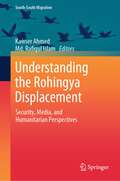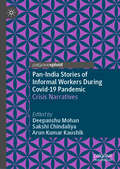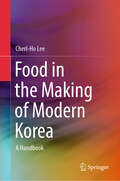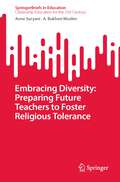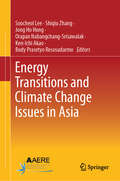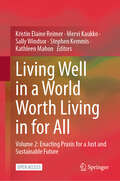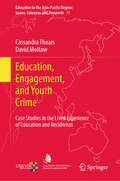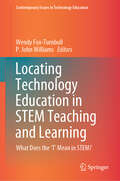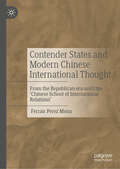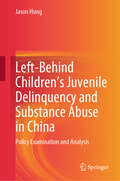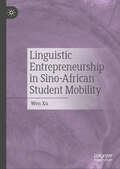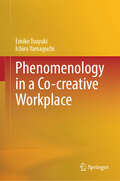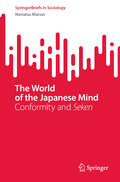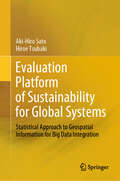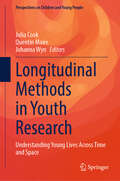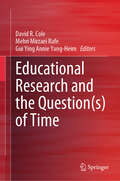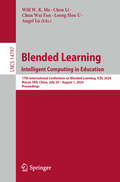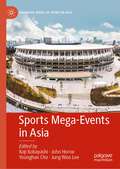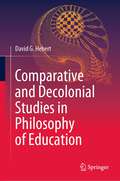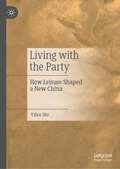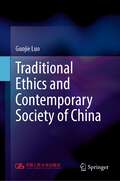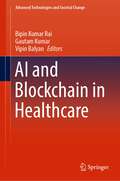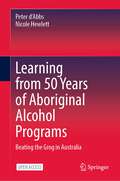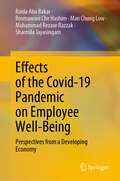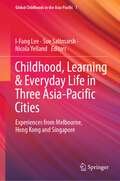- Table View
- List View
Understanding the Rohingya Displacement: Security, Media, and Humanitarian Perspectives (International Perspectives on Migration)
by Kawser Ahmed Md. Rafiqul IslamThis book provides a focused and comprehensive understanding of the conflict surrounding the Rohingya displacement, using a unique peace and conflict transformation viewpoint. Divided into four sections and nineteen chapters, it covers significant themes related to the conflict. It provides an in-depth examination of its security implications, media impact, and the need for a long-term transformation strategy. The authors offer a sharp perspective on the crisis, covering a wide range of topics, including human rights abuses, geopolitics, media influence, and repatriation of the Rohingya. Each chapter focuses on a different aspect of the conflict, providing readers with a thorough understanding of the Rohingya displacement-related conflict. The authors advocate for a peaceful end to the conflict through repatriation, offering valuable conflict transformation tools for decision-makers in Bangladesh and around the world. This book is essential for anyone seeking a deeper understandingof the conflict's security implications and highlights original research from academics on the role of the media. It is relevant for scholars, politicians, decision-makers in the security and refugee management fields, academics studying the media, and humanitarian actors.
Pan-India Stories of Informal Workers During Covid-19 Pandemic: Crisis Narratives
by Deepanshu Mohan Sakshi Chindaliya Arun Kumar KaushikThis book aims to delve into the application of feminist ethnography by engaging with the lived experiences of vulnerable workers, occupied by India’s informal workforce, across its deeply stratified labour-market landscape. Set up and organized in a diverse spatial trajectory through identified case studies from across India, the book, in a post pandemic context, aims to study, critically reflect on the vulnerable state of India’s workforce, capturing the daily emergencies, livelihood of marginalized communities. Case studies in the book feature the pandemic-crisis narratives of farmers, fisherfolk, factory workers, artisans, small scale entertainment providers, sanitation, and waste workers, to name a few.By understanding the intersectional dimensions of social structures like caste, gender, and class our case studies in the book also attempt to unpack the ‘dualities’ present in the contemporary understanding of India’s labour market. Reflective discussions with field ethnographers through first-person narratives help documenting their own observations from different case studies, while focusing on interactions on how to work through power dynamics and varied positionalities across dynamic field sites marked with different spatial characteristics. The text is primarily aimed at students and peer scholars of development studies, or for those who interested in learning about the application of ethnographic methods to studying/understanding the governing dynamics of informality across India and South Asia.
Food in the Making of Modern Korea: A Handbook
by Cherl-Ho LeeThis handbook offers an updated and comprehensive presentation of knowledge on Korean modern and contemporary food history. It covers the changes in food availability, nutrition, and the health status of Koreans, and the Korean food industry's development from the late period of Joseon dynasty in the mid-19th century, to the present. This period includes the severe poverty and food shortage of the Joseon dynasty, followed by the Japanese invasion, Independence and the South-North division, the Korean war, and rapid industrial development. The influence of national and international environments and political changes during the last 150 years on the Korean food security and the nutritional situation of the people is demarcated. In doing so, the author makes novel suggestions on possible contributions to alleviate the world food crisis in the future. Relevant to food historians and food scientists, and East Asian studies scholars with a particular interest in Korean culture and history,this is a pioneering work that elucidates the driving forces for the development and betterment of Korean society—through food acquisition.
Embracing Diversity: Preparing Future Teachers to Foster Religious Tolerance (SpringerBriefs in Education)
by Anne Suryani A. Bukhori MuslimThis book presents a detailed discussion of Indonesian future teachers’ experience of religious diversity, tolerance and intolerance, their level of intellectual humility, and intentions to foster religious tolerance. Drawing from large-scale mixed methods research conducted in Indonesian universities involving over one thousand three hundred future teachers from diverse religious backgrounds, this book demonstrates that religion and religious beliefs can, and do, shape the way future teachers view their teaching practices and pedagogies. The book sheds light into the under-researched yet prominent issue of integrating tolerance into teacher education preparation. It is set in the largest Muslim-majority country in the world which, in recent years, has seen a gradual degradation of secularity while religion becomes more dominant across all levels and sectors of society. This novel and timely book is of interest to researchers, scholars, and students in religious studies, education, social sciences, and Asian studies, as well as anyone interested in the interplay between religion and education in the 21st century.
Energy Transitions and Climate Change Issues in Asia
by Soocheol Lee Ken-Ichi Akao Budy Prasetyo Resosudarmo Shiqiu Zhang Jong Ho Hong Orapan Nabangchang-SrisawalakThe rapid pace of economic development and urbanization in Asia have led to several major problems such as greenhouse gas emissions, mass consumption, and depletion of natural resources. These problems pose a major threat to a sustainable future for Asia and are hindering many Asian countries' goal of becoming carbon-neutral by the middle of this century. Solving these problems requires a comprehensive understanding of the nature of energy consumption, exploitation of natural resources, and deterioration of the environment.To accelerate the green energy transition and promote efficient resource use in Asia, a range of policy options and joint efforts among Asian countries will be required, including carbon pricing, resource tax reform, the expansion of transition finance, support for the development of low-carbon, and resource-efficient social infrastructure. However, Asia is home to many countries, each in a different stage of economic development and with its own culture and customs. Practical implementation of these policies will require bringing together researchers, policymakers, and citizens to share their knowledge and engage in discussions to generate policy ideas that are appropriate for each country. The purpose of this book is to share theoretical and empirical knowledge and convey policy implications that can be expected to accelerate energy transition and resource use effectiveness toward a sustainable future in Asia.
Living Well in a World Worth Living in for All: Volume 2: Enacting Praxis for a Just and Sustainable Future
by Stephen Kemmis Kathleen Mahon Mervi Kaukko Kristin Elaine Reimer Sally WindsorThis open access book is the second of a two-volume series that explores how people are living well and creating a “World Worth Living in for All”. It engages in deep listening of voices from across the world and considers the role of education in creating a more just and sustainable world for the future. The book asks what can be learnt to create change in policy and practice in order to enact praxis. It showcases chapters from international authors who discuss current or new projects to address the overarching questions explored in the book. It also provides an overview of perspectives that connect both volumes and the individual projects presented together through the lens of practice architectures.
Education, Engagement, and Youth Crime: Case Studies in the Lived Experience of Education and Recidivism (Education in the Asia-Pacific Region: Issues, Concerns and Prospects #71)
by Cassandra Thoars David MoltowThis book presents insights into how affective educational experiences may be associated with youth criminal behaviour and the pathway to recidivism. It explores the perspectives and lived school experiences of five young adult male prison inmates, including while they were incarcerated as youths. Through these case studies, the book explores the relationship between affective engagement in education and recidivism.This book shows that participants were affectively disengaged from education prior to their initial incarceration in a youth detention facility, and that their disaffection before, during, and after youth incarceration both generated and impacted on their cognitive and behavioural disengagement from education. Moreover, a range of additional factors not directly causally related to their schooling were shown to have had a significant effect on their engagement in education. The book considers a number of key findings. First, the foundational role that a sense of belonging plays in how young people experience education and its relation to crime. Second, the importance of individualized transition plans for youth at risk, and youth offenders before, during, and after incarceration. Third, the extent to which successful transition from youth offending and recidivism hinges on interagency collaboration. This book will be beneficial to teacher educators, education researchers, criminologists and sociologists.
Locating Technology Education in STEM Teaching and Learning: What Does the ‘T’ Mean in STEM? (Contemporary Issues in Technology Education)
by Wendy Fox-Turnbull P. John WilliamsThis book offers clarity and consistency of thinking in relation to Technology Education when situated within a STEM approach to teaching. It examines the range of Innovations and Issues which are being considered by schools as they implement STEM, with particular focus on the place of Technology, or the ‘T’ in STEM. The book is divided into three sections: Philosophy, Implementation and Issues and Innovations, with each containing five to seven chapters. The first section lays the foundations for the remainder of the book: it focuses the readers on the technology aspect of STEM education and situates it to align with the international understanding of technology education. The second section provides insights into how STEM is best implemented to give technology due consideration across a range of disciplines with technology education, including engineering, food technology, and textile technology. This section also provides suggestions for the successful implementation of the STEM approach, and offers further insight through a range of case studies. The third section outlines and discusses a range of issues that pose a threat to the position and understanding of technology within the STEM teaching and learning approach. This section also examines how technology and STEM are situated within, are supported or are threatened by, other current innovations and approaches to teaching an integrated curriculum, such as the Maker Space Movement and Play-based Learning.
Contender States and Modern Chinese International Thought: From the Republican era until the ‘Chinese School of International Relations’
by Ferran Perez MenaThis book contends that the development of modern Chinese international thought has been profoundly shaped by the distinctive nature of the Chinese state as a contender state and its global positioning since 1912. The argument posited demonstrates that, notwithstanding the varied perspectives on the 'international' held by Chinese intellectuals throughout the 20th century, there exist commonalities across the periods analyzed in this book. In essence, the book emphasizes that the shared elements influencing the production of modern Chinese international thought do not derive from a unified cultural Chinese identity but rather stem from China's evolving geopolitical position in the modern world.
Left-Behind Children’s Juvenile Delinquency and Substance Abuse in China: Policy Examination and Analysis
by Jason HungThis book constructs the theoretical framework based on a range of prominent social theories to address how juvenile delinquency is socioeconomically constructed. Here the presentation of conceptual details is supported by Chinese literature that rationalises, problematises, and analyses how left-behind children are vulnerable to premature smoking, heavy drinking and drug abuse and. I critically review all the most recent publications to highlight the most updated socioeconomic structure of juvenile delinquency experienced by Chinese left-behind children. In addition, the author summarises and analyses all the most up-to-date policy recommendations and evaluations concerning the mitigation of left-behind children’s juvenile delinquency. The policymaking outputs help inform readers on how Chinese policymakers have specifically been endeavouring to intervene in left-behind children’s delinquent behaviours and what policy directions the corresponding policymakers are trending towards in the future.
Linguistic Entrepreneurship in Sino-African Student Mobility
by Wen XuThis book explores African international students’ lived experience within Chinese higher education, including their language ideologies, investment in Chinese language learning and the (re)shaping of identities and aspirations. Whilst high English proficiency has been sought by globally mobile students to play the ‘class game’ and gain entrée to the circle of elites, considerably less attention has been paid to how shifting global structures and China’s semi-peripheral position shape its language learners’ investment and identity construction. Drawing upon a series of interviews, the book deciphers African students’ logics of linguistic exchanges within the geopolitical and geo-economic context of China-African relations. The students invested heavily into Chinese language learning and use, while displaying perfectionism, linguistic entrepreneurship and linguistic insecurity. As the value of their Chinese linguistic capital increases, they reassessed their sense of themselves and produced different social identities, which includes the idea of ‘the world is my oyster’, contributing to Africa’s sustainable development and the disposition to ‘tell China’s story well’. This work transgresses monolingual dominance (i.e. English) in the existing body of international student mobility and second language acquisition (SLA) research, as great importance is assigned to Chinese as linguistic capital in South-South student migration. The book is of interest to researchers in international higher education, international student mobilities, sociolinguistics, applied linguistics, languages education, and Chinese language teaching and learning.
Phenomenology in a Co-creative Workplace
by Ichiro Yamaguchi Emiko TsuyukiThis book introduces phenomenology to reveal how the atmosphere and relationships in the workplace are generated and how this affects creativity. In their daily work, people sometimes feel that "today's meeting was more exciting than expected" or that "everyone's motivation is down”. This unspoken workplace atmosphere has a significant impact on their work. But has enough thought been given to how this workplace atmosphere is created? Phenomenology reveals the basic structure of human relationships in the workplace. Are there any general rules that govern human interaction and the nature of relationships in that workplace? If these unspoken rules can be made explicit – clearly felt and spoken — people can work together to bring about a creative workplace in which individuals can maximize their abilities. The main point of the book is that human relationships are based on a two-layered structure: "emotional communication", which is rooted in human sensitivity and centers on sensation and emotion; and "verbal communication", which is based on shared intelligence and relies upon language and thought. The invisible layer of emotional communication is always at work as the foundation of verbal communication, creating what can be described as the "workplace atmosphere”. This book offers a new perspective on promoting creativity in the workplace by unraveling the principles behind the structure of workplace atmospheres.
The World of the Japanese Mind: Conformity and Seken (SpringerBriefs in Sociology)
by Noriatsu MatsuiThis book investigates the source from which the pressure to conform arises in Japanese society. Even though the contemporary Japanese word for “society” (Shakai) has a history of 140 years, it does not include the concept of respecting the individual but refers mainly to social frameworks and institutional aspects. At the same time, the traditional Japanese terms for “society”, primarily Seken, that have been in use for 1,400 years have embraced human relationships of the members of the group.The hypothesis of this book is that there is no “society” as such in Japanese people’s minds. By proposing a new model (the Hand-Carved Tripod Model) of conformity in Japan, the book shows the structure of the pressure to conform. The tripod is composed of ambiguous words, the sense of belonging, and the “air”, or understanding, that represents the unwritten rules and regulations of Seken.Conformity in Japanese people’s minds takesdifferent forms, from small residential groups to corporations at work, and to nationwide associations, but always dictates that people follow everyone else in the organization.This book examines the sense of being blocked in Japan that has prevailed over 30 years, during the period of the so-called Three Lost Decades in Japan. Examining phenomena such as low worker engagement, karoshi (death by overwork), high middle-age male suicide rates, bullying in school and at work, sex discrimination, hereditary membership in the Diet, and failure to provide adequate protection for whistle-blowers, this book reveals a common structure in Japanese minds: lack of respect for individuality, and the traditional and narrow sense of the world, i.e., Seken.This book will be beneficial to scholars and graduate students as well as to businesspeople who are interested in understanding the behavior and minds of Japanese people from the psychological,cultural, and historical viewpoints. It provides an integrated view of Japan’s Seken as the platform that generates their conformity.
Evaluation Platform of Sustainability for Global Systems: Statistical Approach to Geospatial Information for Big Data Integration
by Aki-Hiro Sato Hiroe TsubakiThe authors of this book assert that Grid Square statistics, a method of aggregating data within a geographically defined Grid, may be an effective solution to approach geospatial data for big data integration. Grid Square statistics is a technique that allows us to collect and analyze data based on Grids and makes it easier to understand patterns and trends. Sustainability, a key concern for the future of our society, often involves balancing multiple independent objectives. These objectives and key performance indicators must be shared to solve multi-dimensional optimization problems with some constraints related to sustainability issues. However, many of these sustainability issues are challenges that are part of global systems, which are modeled as a complex system consisting of many components. Social, economic, and environmental aspects in our socio-economic systems require solutions designed for the sustainability of our society. These conditions imply that Big Data must contribute to evaluating our current situation, actions, and changes to continuously change our behavior and society based on a Plan-Do-Check-Action (PDCA) cycle. The PDCA cycle, also known as the Deming cycle, is a four-step management method used to improve processes and products continuously. We must understand how to construct a platform by using Big Data to do so. Thus, extracting meaningful information from Big Data is crucially important in the advanced information society. This book provides case studies based on Grid Square statistics. It shows their applications to socio-economic and environmental problems such as tourism, where we analyze visitor patterns to optimize resource allocation, SDGs indicator, where we monitor the sustainability of our socio-economic systems, and disaster management, where we face natural disaster to enhance preparedness. Finally, the book proposes a World Grid Square Statistics Reference Architecture for constructing data applications across organizations and domains and reports on design concepts, system architecture, and the implication of a data platform for World Grid Square data and statistics.
Longitudinal Methods in Youth Research: Understanding Young Lives Across Time and Space (Perspectives on Children and Young People #15)
by Johanna Wyn Julia Cook Quentin MaireThis book addresses how longitudinal research approaches are used to understand young people’s lives. It elucidates how youth researchers use longitudinal approaches, and how longitudinal research can help us to both understand and shape the field of youth sociology. Chapters discuss the creation of knowledge about youth and how longitudinal research shapes the field of youth sociology and shed light on key tensions and emerging debates in longitudinal youth research ranging from research design to data collection, analysis, and use. It considers longitudinal studies using a broad range of methods, including qualitative, quantitative, mixed methods, retrospective methods, and creative and participatory methods. This collection offers insights from longitudinal youth scholars conducting research in Argentina, Lithuania, Australia, Estonia, Canada, the United States (US), the United Kingdom (UK), Finland and India. These researchers reflect on the future of longitudinal youth research, addressing emerging and prospective issues. This book provides a concise survey of key established and emerging areas of concern in longitudinal research and of the relationship between these areas and the field of youth studies more specifically.
Educational Research and the Question(s) of Time
by David R. Cole Mehri Mirzaei Rafe Gui Ying Annie Yang-HeimThis book fully explores the question(s) of time in educational research and achieves the acceleration and merging of inquiry with action to understand change and implement these findings through practice. It deals with the philosophy of education, higher education, schooling (the curriculum), time displacement, technology, the environment and policy. This book focuses on time revolution(s). It explores new ways of thinking about time, that question a linear/arrow in time, and sets into motion an educational research agenda to extract revolutions of time. Furthermore, this book figures the dimension of time in teaching and learning by extending and deepening the engagement with time in education. For example, it analyzes the climate crisis in terms of education and how the realization that the climate is changing sits parallel and adjacent to pedagogy. The climate crisis and how to do anything about it through education is an example of how considering the dimension of time opens up education beyond quick or narrow fixes and introduces a profound synthesis for the future.
Blended Learning. Intelligent Computing in Education: 17th International Conference on Blended Learning, ICBL 2024, Macao SAR, China, July 29 – August 1, 2024, Proceedings (Lecture Notes in Computer Science #14797)
by Will W. K. Ma Leong Hou U Chen Li Angel Lu Chun Wai FanThis book constitutes the refereed proceedings of the 17th International Conference on Blended Learning. Intelligent Computing in Education, ICBL 2024, held in Macao, China, during July 29 - August 1, 2024. The 26 papers presented in this volume were carefully reviewed and selected from 71 submissions. The selected papers are classified into four primary themes: revolutionizing education with AI; blended learning and technological innovations; advancements in learning analytics; and innovative approaches in educational research.
Sports Mega-Events in Asia (Palgrave Series of Sport in Asia)
by Koji Kobayashi John Horne Younghan Cho Jung Woo LeeThis book is the first comprehensive collection focusing on the hosting of sports mega-events within Asia and their impact on the politics, economics, and culture that shape, and are shaped by, the local idiosyncrasies of host cities and countries across this most culturally diverse continent. From the Olympic Games and single sport World Cups, to the Asian Games and their sub-regional variations, an increasing number of Asian countries have rapidly developed their capacity to host and mobilize large-scale sports events as a cornerstone of their economic growth, national identity formation, and international prestige. This book sets out to fill a gap in the literature and will be of particular relevance to those who are interested in globalization, sports studies, political economy, cultural studies, event management and policy, sociology, media studies, and Asian studies
Comparative and Decolonial Studies in Philosophy of Education
by David G. HebertThis book introduces the educational philosophies of notable African and Asian thinkers who tend to be little recognized in Europe and North America. It offers specific resources for diversification of higher education curricula. The book expands the philosophy of education, in clear language, to include ideas of major non-western educational thinkers who are little discussed in previous publications. It includes critical analysis of non-western concepts and consideration of their relevance to schools worldwide. The book features discussions of how the work of Tagore and postcolonial thinkers offers diverse visions that increasingly inspire a decolonizing approach to education. This book offers a unique emphasis on how a decolonized philosophy of education can especially enable a rethinking of approaches to education in arts and humanities subjects.
Living with the Party: How Leisure Shaped a New China
by Yifan ShiThis book explores the subcultures, cultural trends and regulations of leisure and subcultures among young people in Beijing from 1949 to the 1980s. It complicates our understanding of the successes of the CCP and the nature of those successes—more a synergy or synthesis than victory over society or defeat. It argues that while the CCP aimed to direct the most private sphere in people’s everyday life (i.e., leisure), it did not achieve this goal by coercive means, but by appealing ways through organized leisure activities. This book suggests that although elements of youth subcultures can be observed throughout the Mao era, we should not treat them as a way of passive resistance. Instead, we must position these subcultures between different layers of the Party’s leisure regulation to examine what the CCP actually achieved. Many people who engaged in subcultures defied the blatant politicization of their leisure, some might have defied the process of collectivization, but few defied the process of institutionalization during which people did not find state intervention contradictory to their own way of pleasure-seeking. This book also suggests that instead of regarding the Deng Xiaoping era as a breakaway from Maoist interventionist rule, we need to see the historical continuity as revealed by the Party’s uninterrupted policy of leisure regulation. Thought provoking and at times amusing, this book will interest sinologists, historians, and scholars of China's social form.
Traditional Ethics and Contemporary Society of China
by Guojie LuoBased on the ethical thinking of the pre-Qin Dynasty, this book discusses the formation and development of traditional Chinese ethics, the refinement of the Confucian ethical normative system and the establishment of its orthodoxy, as well as the deepening and maturation of feudal ethics. The book is simple in style and clear in context. It contains not only the essence of traditional Chinese morality but also the achievements of modern civilization. It analyzes the implications of traditional Chinese ethics on the governance and moral construction of modern society and can be used as a reference for governance and revitalization of the country and moral development.
AI and Blockchain in Healthcare (Advanced Technologies and Societal Change)
by Bipin Kumar Rai Gautam Kumar Vipin BalyanThis book presents state-of-the-art blockchain and AI advances in health care. Healthcare service is increasingly creating the scope for blockchain and AI applications to enter the biomedical and healthcare world. Today, blockchain, AI, ML, and deep learning are affecting every domain. Through its cutting-edge applications, AI and ML are helping transform the healthcare industry for the better. Blockchain is a decentralization communication platform that has the potential to decentralize the way we store data and manage information. Blockchain technology has potential to reduce the role of middleman, one of the most important regulatory actors in our society. Transactions are simultaneously secure and trustworthy due to the use of cryptographic principles. In recent years, blockchain technology has become very trendy and has penetrated different domains, mostly due to the popularity of cryptocurrencies. One field where blockchain technology has tremendous potential is health care, due to the need for a more patient-centric approach in healthcare systems to connect disparate systems and to increase the accuracy of electronic healthcare records (EHRs).
Learning from 50 Years of Aboriginal Alcohol Programs: Beating the Grog in Australia
by Peter d’Abbs Nicole HewlettThis open access book deals with community-based attempts on the part of Aboriginal communities and groups in Australia to address harms arising from alcohol misuse. Alcohol-related harms are viewed as both a product of colonisation and dispossession and a contributor to ongoing social, economic and health-related disadvantage, both in Australia and in other countries with colonised Indigenous populations, such as Canada, the US and New Zealand. This book contributes to an evidence-base by bringing together a selection of existing Australian documents considered by the editors to have continuing relevance to all those concerned with dealing with alcohol-related harms among Aboriginal peoples, These are contextualised in original chapters that recount key events, ideas, and programs. The book is a practical resource for all people and groups concerned with addressing Aboriginal and Torres Strait Islander alcohol-related harms, both at the community level and at the level of policy-making and administration.
Effects of the Covid-19 Pandemic on Employee Well-Being: Perspectives from a Developing Economy
by Raida Abu Bakar Rosmawani Che Hashim Man Chung Low Mohammad Rezaur Razzak Sharmila JayasingamThis book contributes toward the understanding of the human experience at work during the pandemic and its implications on employee well-being in the context of Malaysia, a developing economy with its own set of unique challenges. Very little research has been done about this issue to date, particularly in Malaysia. This book aims to bridge this gap by examining the Malaysian perspective of the concept of employee well-being in detail with the overarching goal of serving as a guide toward overcoming the challenges wrought on by the ever-changing post-pandemic environment. Different conditions and experiences are discussed to contextualize the unique ways in which individuals react to difficulties with an emphasis on how organizations can assist at a micro-level to allow employees to overcome such difficulties.
Childhood, Learning & Everyday Life in Three Asia-Pacific Cities: Experiences from Melbourne, Hong Kong and Singapore (Global Childhoods in the Asia-Pacific #1)
by I-Fang Lee Sue Saltmarsh Nicola YellandThis book introduces findings from an international, cross-cultural, and interdisciplinary study of children’s everyday experiences of growing up and going to school in the context of the three global cities of Hong Kong, Singapore and Melbourne. It takes the premise that children’s learning and orientations to educational success are shaped by everyday cultural practices at home and at school, by policy contexts that both produce and respond to educational and cultural norms, and by individual and familial desires and aspirations. Drawing on research conducted with primary school-aged children in Year 4, the book considers how day-to-day routines such as going to school, engaging in extra-curricular activities outside of school, and spending time at home with family intersect with the broader milieus of education policy ideals in a changing and interconnected world. Through a combination of visual methodologies, surveys, ethnographic observations in schools, classrooms and cityscapes, re-enactments of everyday activities with children at home, and sociological education policy analysis, this book shows both the richness of children’s everyday lives and learning in global cities, as well as exploring questions that pose challenges to educational and social norms.
